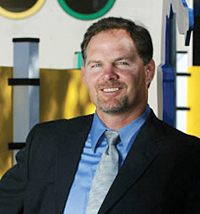| |
 |
| |
Jim
Scherr '89 |
| |
|
| |
|
| |
|
Alum's
marketing savvy spurs 'wrestlemania'
By
Chris Van Nostrand
Between
600 and 1,000 spectators attended the 1988 U.S. Olympic Wrestling
Trials. In 2000, over three days, 60,000 fans came to watch
the nation's top wrestlers compete for spots on Team USA.
This booming
interest in the sport occurred under the leadership of Jim
Scherr '89, who in April was named CEO of the U.S. Olympic
Committee after serving as executive director of USA Wrestling
from 1990 to 2000. Scherr built a core audience for wrestling
by transforming the competitions into entertainment events,
but he also focused on developing athletes. The team earned
eight medals at the 1996 Summer Atlanta Olympics, the most
of any nation.
When Scherr
joined the USOC to lead its wrestling program, he maintained
a clear vision: "I wanted the organization to become what
I wished it had been when I was an athlete," he says. A 1988
Olympic wrestler - and former NCAA champion - Scherr knew
the type of services and support required to compete at the
highest level.
While
improved funding for coaching and training enhances athletic
performance, Scherr believes that the Olympic Games fulfill
a broader mission for the American public. "[They] feel they
are connected, a part of the U.S. Olympic team . . . and they
expect Olympic athletes to be their ambassadors to the world
and a reflection of American society." As such, the athletes'
conduct and achievements serve as evidence of "national vigor."
As Scherr
continues to build the USOC into an efficient and athlete-centric
organization, he looks back fondly on his Kellogg experience.
After competing at the highest levels in a grueling individual
sport, he credits the school with his "learning how to work
within a team to get something accomplished." It's a critical
skill for an executive who believes his organization should
reflect the best qualities of some of the world's best athletes.
|





